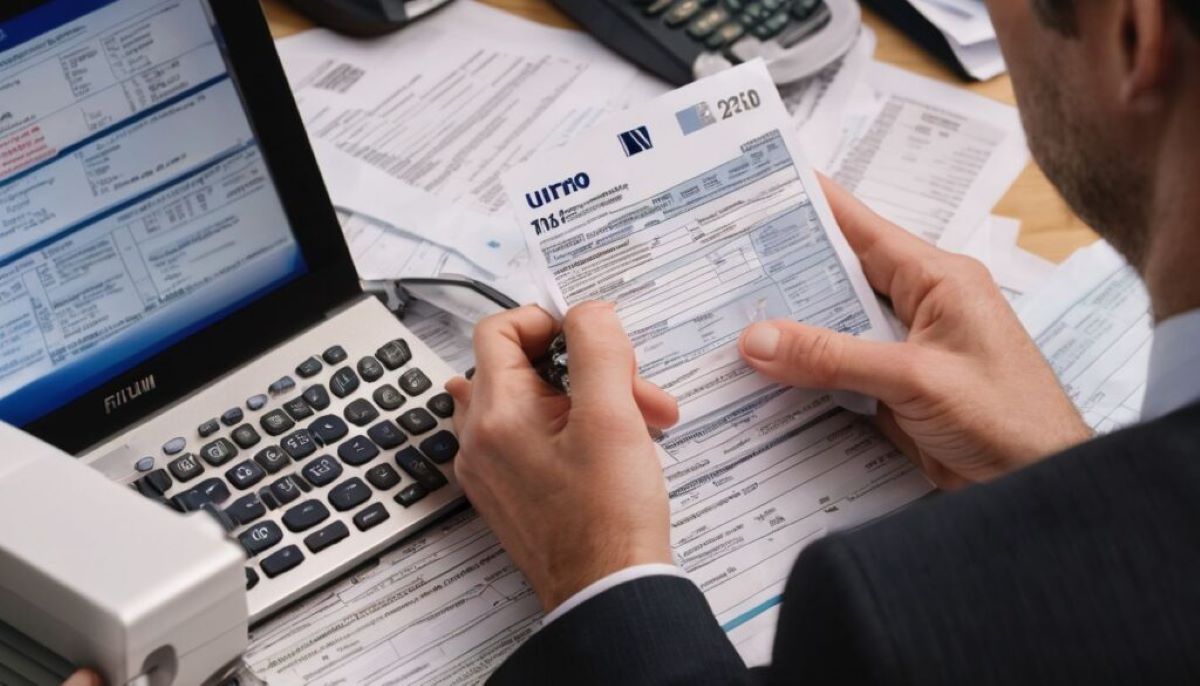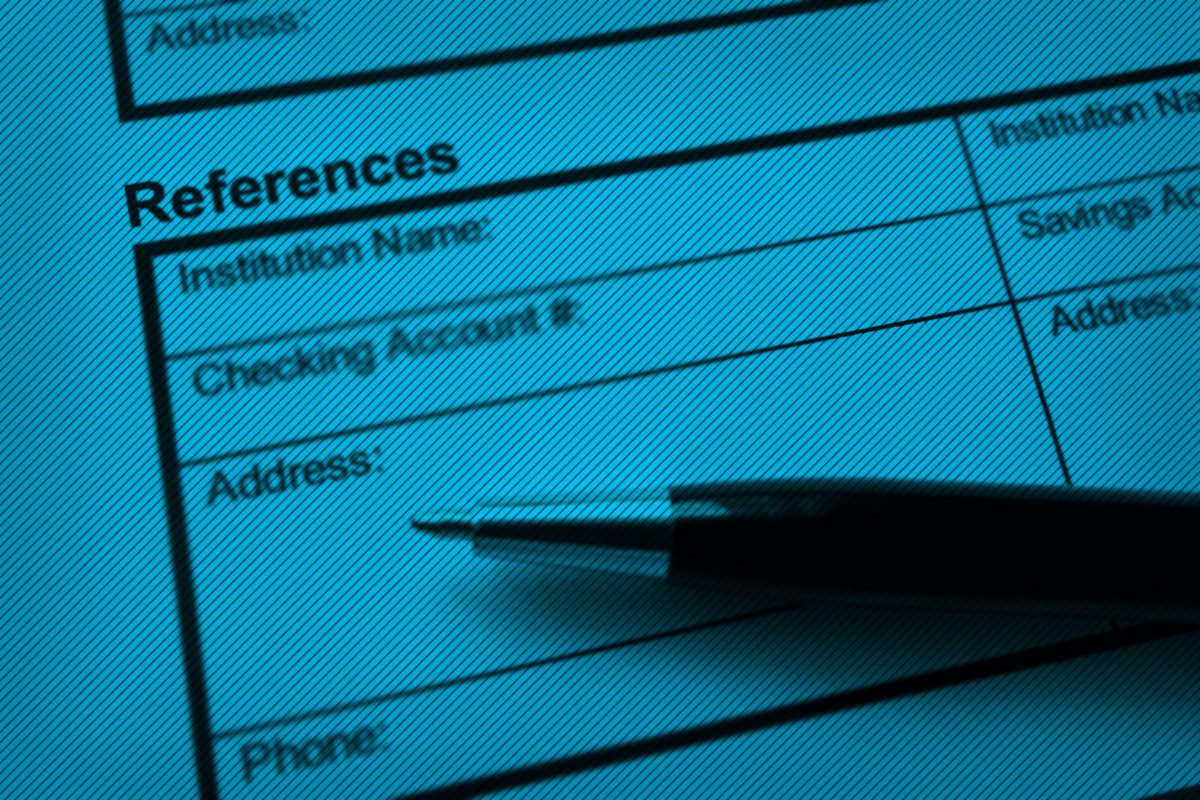Home>Finance>What Are Trade References On A Credit Application


Finance
What Are Trade References On A Credit Application
Modified: February 21, 2024
Learn what trade references are and why they are important to include on a credit application. Improve your financial credibility with expert advice on trade references in finance.
(Many of the links in this article redirect to a specific reviewed product. Your purchase of these products through affiliate links helps to generate commission for LiveWell, at no extra cost. Learn more)
Table of Contents
- Introduction
- Definition of Trade References
- Importance of Trade References on a Credit Application
- How to Obtain Trade References
- What Information Should be Included in Trade References
- How Trade References are Used in Evaluating Creditworthiness
- Tips for Providing Strong Trade References
- Common Mistakes When Providing Trade References
- Conclusion
Introduction
When applying for credit, whether it’s a business loan or a credit line, lenders and financial institutions often request trade references as part of the application process. Trade references play a crucial role in determining an applicant’s creditworthiness and ability to repay the borrowed funds.
But what exactly are trade references? In simple terms, trade references are the names and contact information of other businesses or suppliers that you have traded and maintained a credit relationship with in the past. These references serve as a way for lenders to assess your credit history and determine if you have a track record of paying your debts on time.
In this article, we will explore the significance of trade references on a credit application and why they are critical in the evaluation process. We will also discuss how to obtain trade references, what information should be included, and provide tips on how to provide strong trade references that can positively impact your creditworthiness.
Understanding the role of trade references and how they are used in assessing credit applications can help you prepare and strengthen your credit profile, increasing your chances of securing the credit you need to support your business growth or personal financial goals.
Definition of Trade References
Trade references are a crucial component of a credit application, providing lenders with valuable information about an applicant’s creditworthiness and payment history. In essence, trade references are the names and contact information of other businesses or suppliers that you have conducted business with in the past and have maintained a credit relationship.
When you provide trade references on a credit application, you are essentially giving permission for the lender to contact these references and inquire about your payment history, credit limits, and overall creditworthiness. These references can range from vendors and suppliers to landlords, utility companies, and even financial institutions.
While personal references, such as friends or family members, may be included in a credit application, trade references hold greater importance due to their relevance to your business or financial transactions. They provide concrete evidence of your ability to fulfill financial obligations and make payments on time.
Trade references typically include important information such as the name of the company or individual, phone number, email address, and, in some cases, the length of time you have been doing business with them. Additionally, you may be required to provide the type of credit you have utilized with each reference, whether it’s a revolving credit line, net terms, or other forms of credit.
It’s important to note that trade references should be entities that have extended credit to you or have been involved in monetary transactions, rather than personal acquaintances or individuals who have not been involved in business dealings with you. By providing trade references that are relevant to your business or financial activities, you increase the credibility of your credit application and the likelihood of being approved for the credit you need.
Importance of Trade References on a Credit Application
Trade references play a crucial role in the evaluation of a credit application because they provide valuable insights into an applicant’s creditworthiness and financial responsibility. Lenders and financial institutions rely on trade references to assess the applicant’s ability to manage credit and make timely payments. Here are some key reasons why trade references are important in the credit application process:
- Evidence of Payment History: Trade references serve as documented evidence of your payment history. By contacting your trade references, lenders can verify if you have a track record of making payments on time. If your trade references confirm that you consistently meet your financial obligations, it can strengthen your creditworthiness and increase the likelihood of your credit application being approved.
- Validation of Creditworthiness: When lenders review your trade references, they are essentially seeking validation that you are a responsible borrower. Positive trade references from reputable businesses or suppliers can significantly enhance your creditworthiness and build trust with lenders. This validation helps lenders assess the level of risk associated with extending credit to you.
- Assessment of Financial Stability: Trade references also allow lenders to assess your overall financial stability. By contacting your trade references, lenders can gain insights into your ability to manage credit, maintain a positive cash flow, and meet financial obligations. This assessment helps lenders make more informed decisions about the amount of credit they are willing to extend to you.
- Establishing a Credit History: For individuals or businesses with limited credit history, trade references are instrumental in establishing a credit profile. By providing positive trade references, you can start building a strong credit history, making it easier for future credit applications. It demonstrates to lenders that you have successfully managed credit in the past.
- Differentiation from Competitors: In a competitive credit market, trade references can help you stand out from your competitors. Strong trade references can provide lenders with the assurance that you are a reliable borrower, potentially giving you a competitive advantage in securing credit at favorable terms and conditions.
By providing comprehensive and positive trade references on your credit application, you can enhance your creditworthiness, increase your chances of approval, and potentially secure credit at more favorable terms.
How to Obtain Trade References
Obtaining trade references is a crucial step in the credit application process. These references provide lenders with important information about your credit history and can significantly impact the outcome of your application. Here are some effective ways to obtain trade references:
- Establish Relationships with Suppliers: One of the easiest ways to obtain trade references is by developing strong relationships with your suppliers. When you consistently make on-time payments and maintain positive communication with suppliers, they are more likely to provide you with a favorable trade reference when requested.
- Ask for Trade References: If you have a good working relationship with other businesses, don’t hesitate to request a trade reference from them. Reach out to trusted partners, vendors, or anyone you have conducted financial transactions with. Explain the purpose of the trade reference and assure them that their support will be appreciated.
- Networking: Attend industry trade shows, conferences, or events where you can build connections with other business owners in your industry. Networking can help you establish new relationships that may serve as potential trade references in the future. Remember to nurture these relationships and maintain regular communication.
- Trade Associations and Chambers of Commerce: Joining trade associations and local chambers of commerce can provide you with access to a network of businesses. Participating in these organizations allows you to meet potential trade references who share common interests and goals. Active participation and involvement can increase your chances of obtaining strong trade references.
- Bank and Financial Institution References: If you have a good relationship with your bank or financial institution, consider asking them for a trade reference. Lenders often value references from reputable financial institutions, as they provide insights into your financial stability and credibility.
Once you have identified potential trade references, it’s important to establish regular communication and maintain a positive relationship with them. This will ensure that when the time comes for a lender to contact them, their feedback will reflect positively on your creditworthiness.
Remember, trade references should be entities that have had direct financial transactions with you. They should be able to provide detailed and accurate information about your credit history, making them reliable sources of information for lenders.
What Information Should be Included in Trade References
When providing trade references on a credit application, it’s important to include all the necessary information that lenders would require to assess your creditworthiness. The following information should be included in your trade references:
- Company or Individual Name: Clearly state the name of the company or individual that is providing the trade reference. This allows the lender to identify and contact the reference easily.
- Contact Information: Include the contact details of the trade reference, such as their phone number, email address, and physical address. Providing multiple means of contact ensures that the lender can reach out to the reference conveniently.
- Relationship Duration: Specify the length of time you have been doing business with the trade reference. This helps lenders gauge the level of familiarity and trust that has been built over the course of your relationship.
- Type of Credit: Indicate the type of credit arrangement you have with each trade reference, whether it’s a revolving credit line, net terms, or any other form of credit. This information gives lenders a better understanding of the credit structure you have utilized in the past.
- Payment History: Include details about your payment history with the trade reference. Specify whether you have made consistent and timely payments or if there have been any instances of late payments. It’s crucial to provide accurate information that reflects your payment behavior.
- Credit Limit: If applicable, mention the credit limit or maximum credit amount that has been extended to you by the trade reference. This gives lenders insight into the level of credit you have utilized and your ability to manage it responsibly.
- Additional Comments or Recommendations: If the trade reference is willing to provide additional comments or recommendations about your creditworthiness, it can be highly beneficial. These comments can provide valuable insights and serve as a testament to your reliability and financial responsibility.
It’s important to ensure that the information provided in your trade references is accurate and up-to-date. Double-check the contact details and verify that you have permission to use the trade reference’s information in your credit application.
By providing comprehensive and accurate trade reference information, you can help lenders gather the necessary details to assess your creditworthiness and make informed decisions regarding your credit application.
How Trade References are Used in Evaluating Creditworthiness
Trade references play a significant role in the evaluation of creditworthiness by lenders and financial institutions. They provide valuable insights into an applicant’s financial responsibility and ability to manage credit. Here’s how trade references are used in the assessment process:
- Payment History Verification: Lenders contact trade references to verify an applicant’s payment history. They inquire about whether payments were made on time and if any late payments or defaults occurred. Positive feedback from trade references can demonstrate a consistent pattern of timely payments, reinforcing the applicant’s creditworthiness.
- Creditworthiness Evaluation: Trade references hold credibility in assessing an applicant’s creditworthiness. Lenders consider the reputability and financial stability of the trade references and their willingness to extend credit to the applicant. Positive trade reference feedback can enhance the perception of the applicant’s financial responsibility and increase their creditworthiness.
- Debt Capacity Assessment: Lenders review trade references to determine an applicant’s debt capacity. By examining the credit limits or maximum credit amounts extended to the applicant by trade references, lenders gain insights into the applicant’s ability to handle and manage various credit obligations. This information helps lenders assess the suitability and feasibility of approving the requested credit amount.
- Confirmation of Business Stability: Trade references can provide information about the length of the business relationship, reflecting the stability and longevity of the applicant’s business. Lenders value long-standing partnerships with reputable suppliers, as it signifies business stability and the ability to maintain consistent financial relationships.
- Assurance of Reliability: Positive trade reference feedback provides lenders with reassurance of the applicant’s reliability. It indicates that the applicant has a track record of fulfilling financial obligations and maintaining a responsible credit history. This assurance helps lenders mitigate the risk associated with extending credit and increases the likelihood of credit approval.
- Validation of Financial History: Trade references offer validation of an applicant’s financial history. By contacting trade references, lenders can cross-reference the information provided in the credit application and verify its accuracy. Inconsistencies or discrepancies between the applicant’s claims and the trade reference information can raise concerns and impact the creditworthiness assessment.
Trade references provide lenders with objective insights into an applicant’s creditworthiness and financial behaviors. It is crucial to provide strong and reliable trade references that support a positive assessment of your creditworthiness, increasing your chances of credit approval and favorable terms.
Tips for Providing Strong Trade References
Providing strong trade references on your credit application is essential for enhancing your creditworthiness and increasing the chances of approval. Here are some tips to ensure you provide strong trade references:
- Select Reliable and Reputable References: Choose trade references that are well-established, reputable, and have a proven track record of providing quality goods or services. References from recognized companies within your industry carry more weight and lend credibility to your credit application.
- Maintain Strong Relationships: Building and maintaining strong relationships with your trade references is crucial. Continuously communicate, collaborate, and meet your financial obligations promptly. A positive working relationship can lead to stronger references and improved creditworthiness.
- Ask for Permission: Always ask for permission before including someone as a trade reference on your credit application. Not only is this a professional courtesy, but it also ensures that your references are prepared to receive inquiries and provide accurate and positive feedback about your creditworthiness.
- Keep Trade References Updated: Regularly update your trade references’ contact information to avoid any communication difficulties between the lender and the reference. Ensure that the contact details provided are accurate and up-to-date, including phone numbers, email addresses, and physical addresses.
- Provide Relevant Information: When listing your trade references, include relevant information such as the duration of the business relationship, the type of credit arrangement, and any specific details that highlight your positive payment history and reliability as a debtor. The more information you provide, the better lenders can assess your creditworthiness.
- Communicate Your Purpose: When reaching out to potential trade references, clearly explain the purpose and importance of their role in supporting your credit application. Highlight how their positive feedback can influence the lender’s decision and assure them that their input is valued.
- Follow Up: After listing someone as a trade reference, follow up with them to confirm their willingness to provide the reference if contacted by the lender. This ensures that they are prepared and aware of their role in the credit application process.
- Provide a Diverse Range of References: Include a diverse range of trade references that reflect different aspects of your business relationships. This can include suppliers, vendors, landlords, or financial institutions. A varied selection of references provides a well-rounded perspective on your creditworthiness.
Remember, the quality and strength of your trade references can significantly impact the lender’s perception of your creditworthiness. By carefully selecting and maintaining strong relationships with your trade references, you can present a compelling case for your creditworthiness and increase your chances of credit approval.
Common Mistakes When Providing Trade References
When providing trade references on a credit application, it’s important to avoid common mistakes that could potentially harm your creditworthiness or undermine your chances of approval. Here are some common mistakes to avoid:
- Using Personal References: One common mistake is including personal references, such as family or friends, instead of legitimate trade references. Personal references do not hold the same weight as trade references and may not provide the necessary insights into your creditworthiness.
- Providing Inaccurate or Outdated Information: Ensure that the contact information and details provided for each trade reference are accurate and up-to-date. Inaccurate information can lead to failed communication attempts between the lender and the reference, ultimately delaying or impacting the evaluation process.
- Listing Inactive or Inaccessible Trade References: Including trade references that are no longer in business or are difficult to contact can raise concerns for lenders. Ensure that your trade references are active and accessible to provide accurate information when contacted.
- Not Seeking Permission: Always seek permission from the trade references before listing them on your credit application. Failing to obtain permission can lead to surprise requests from lenders, potentially damaging your relationships with the references and impacting their willingness to provide positive feedback.
- Overlooking the Importance of Strong Relationships: Neglecting to cultivate strong and positive relationships with your trade references can diminish the quality of the feedback they provide. Regularly communicating and maintaining a good business relationship ensures that your trade references can vouch for your reliability and financial responsibility.
- Not Following Up: After obtaining permission and listing trade references, it’s essential to follow up with them to confirm their readiness to provide a reference if contacted. Failure to follow up can result in unprepared references or missed opportunities for positive feedback.
- Failing to Provide Relevant Information: Ensure that you provide all the necessary information about your trade references, including the nature of your credit relationship, the duration of the business association, and any specific details highlighting your positive payment history. Neglecting to include relevant information can leave gaps in your creditworthiness assessment.
- Not Maintaining Consistency: Inconsistencies between the information provided by your trade references and the details in your credit application can raise red flags for lenders. Make sure that the information aligns and accurately represents your payment history and creditworthiness.
Avoiding these common mistakes when providing trade references will help ensure that lenders receive reliable and accurate information about your creditworthiness. Taking the time to carefully select and maintain strong relationships with trade references can significantly enhance your chances of credit approval.
Conclusion
Trade references are an integral part of the credit application process. These references provide lenders and financial institutions with valuable insights into an applicant’s creditworthiness and financial responsibility. Including strong and relevant trade references can greatly enhance your chances of credit approval and more favorable terms.
When providing trade references, it’s important to select reputable and reliable references that can vouch for your creditworthiness. Building and maintaining strong relationships with your trade references by consistently meeting your financial obligations and maintaining open communication is crucial. Seek permission before listing someone as a trade reference and keep their contact information updated.
Including accurate and relevant information about your trade references, such as the duration of the business relationship, type of credit arrangement, payment history, and credit limits, ensures that lenders have a comprehensive understanding of your credit profile. Avoid common mistakes of using personal references, providing inaccurate information, and not seeking permission from trade references.
Trade references play a significant role in evaluating creditworthiness. Lenders rely on these references to verify payment history, assess creditworthiness, evaluate debt capacity, and validate financial stability. By providing strong trade references, you can demonstrate your reliability as a borrower and increase your chances of credit approval.
In conclusion, trade references are a powerful tool in the credit application process. Taking the time to carefully select, nurture relationships, and provide accurate information about your trade references can greatly enhance your creditworthiness and increase your chances of securing the credit you need.














